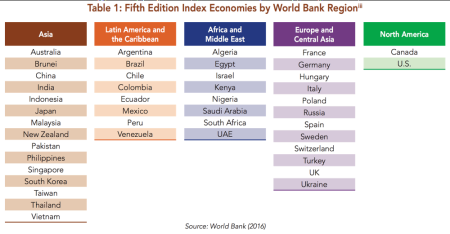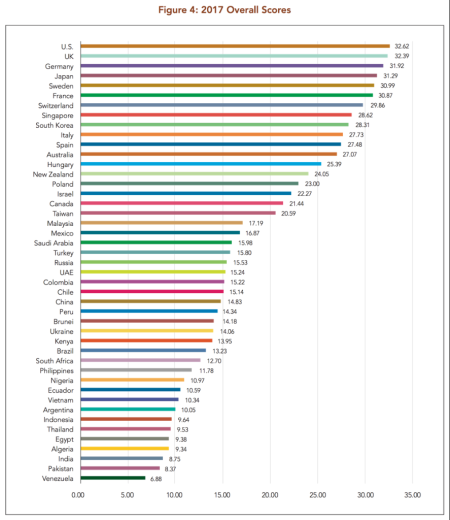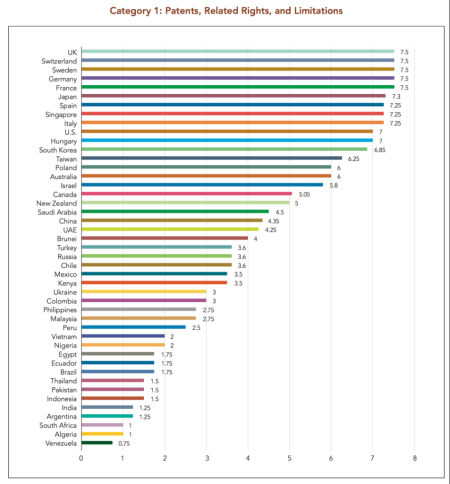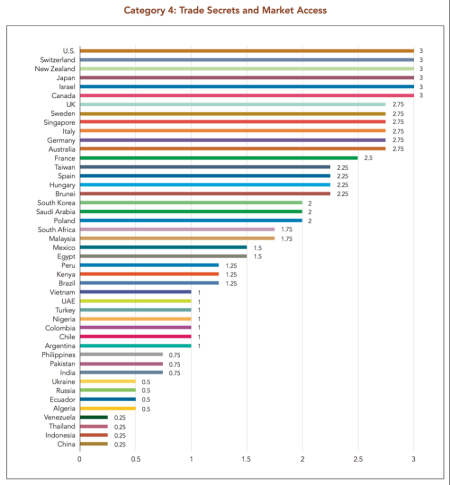
Last month, the U.S. Chamber of Commerce released its 5th annual International IP Index, entitled "The Roots of Innovation," which provides an "IP report card" for 45 world economies that account for 90% of the global gross domestic product. The Index's ratings are based on an analysis of 35 indicators in six categories: (1) patents, related rights, and limitations; (2) copyrights, related rights, and limitations; (3) trademarks, related rights, and limitations; (4) trade secrets and market access; (5) enforcement; and (6) membership and ratification of international treaties.
According to David Hirschmann, president and CEO of the Global Intellectual Property Center (GIPC) of the U.S. Chamber of Commerce, the Index "shows that a clear pack of leaders has emerged" with regard to IP protection: the United States, United Kingdom, Japan, and European Union. However, he also noted that "all that invest in the systemic recognition and protection of IP stand to reap the benefits: foreign investments, healthier home-grown industries that export innovative products, and a reputation as a place where the world can do business." Mark Elliot, executive vice president of GIPC, indicated that "[s]ome developed countries, including Canada and Australia, continue to implement policies that undermine their proud traditions of IP-led innovation," and that "even world leaders such as the U.S. have room to grow and improve."
The Index identified several IP developments, including:
• Several economies recognized the value of leveraging international partnerships through Patent Prosecution Highways (PPH).
• IP-intensive industries continued to face challenges in the Indian market with regard to the scope of patentability for computer-implemented inventions.
• A number of governments attempted to limit the scope of patentability via both judicial decisions and legislation. While the Canadian government continued to apply the heightened patent utility standard, the Indonesian Patent Law introduced a heightened efficacy requirement for patentability and outlawed second use claims.
• Both individual governments and representatives of the multilateral institutions encouraged public officials to utilize compulsory licenses and expanded exceptions and limitations in the name of increasing access. In Colombia, the government threatened to use a compulsory license in an attempt to drive down the price of innovative medicine.
The 45 economies benchmarked by the GIPC are shown in Table 1 of the report (click on table to enlarge), divided by World Bank region.

With the addition of five new indicators in the latest edition of the IP Index, the maximum possible score increased from 30 to 35. Overall scores for the 45 benchmarked economies are shown in Figure 4 of the report (click on Figure to enlarge), with the U.S. (32.62), UK (32.39), and Germany (31.92) finishing in the top three.

With respect to the scores for Category 1 (patents, related rights, and limitations), the UK, Switzerland, Sweden, Germany, and France all finished with a score of 7.5. The remaining scores for this category are shown below (click on Figure to enlarge).

For Category 4 (trade secrets and market access), the U.S., Switzerland, New Zealand, Japan, Israel, and Canada all finished with a score of 3. The remaining scores for this category are shown below (click on Figure to enlarge).

The bulk of the IP Index provides individual reports for each of the 45 benchmarked economies. The report for the U.S. indicates that the overall score dropped from 95% (i.e., a score of 28.61 out of 30) in the 4th edition of the Index to 93% (i.e., a score of 32.62 out of 35) in the latest edition of the Index. With respect to patentability requirements, the report notes that "the patenting environment in the U.S. continues to be affected by uncertainty as to how to interpret Myriad and other key decisions, and greater clarity, consistency, and closing of gaps with international best practices is crucial to upholding a supportive innovation environment." The report also points out that a group of court decisions –- particularly, McRO v. Bandai Namco, BASCOM v. AT&T Mobility, and Amdocs v. Openet Telecom –- "suggests that software patents that otherwise meet patentability criteria may be considered patent-eligible and clarifies that claims directed to software are not automatically considered to be patent-ineligible abstract subject matter."
In discussing patent opposition developments in the U.S., the Index indicates that:
Despite the intention of the new opposition mechanisms, the ease of challenging patents during the post-grant period, particularly via inter partes review, has led to a high rate of trials (particularly for life sciences claims) and of rejections (between 40% and 65% depending on the type of technology), with challenges considered by some experts to be disproportionately funded by bad faith actors.
In view of the above, the Index concludes that "the opposition system in the U.S. still represents a potential channel for bad faith actors and can involve a great deal of cost and uncertainty for patent owners compared to other post-grant opposition systems."
As for trade secret developments, the Index highlights passage of the Defend Trade Secrets Act in 2016, noting that "[t]he new framework aids in enhancing the protection of trade secrets across the U.S."
The GIPC also provided a Supplemental Statistical Analysis with the IP Index. A summary of selected portions of the supplemental analysis will be provided in a subsequent post.